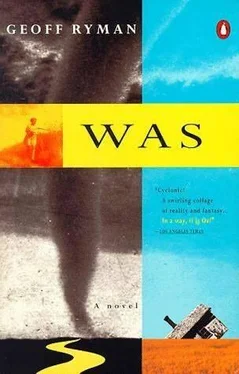Dorothy knew she was big enough to go. Big enough and ugly as a pig's backside, but that made no difference. The weather was perfect, brilliantly sunny without being hot. Em and Henry were away, so she could steal what she needed.
She would go to St. Lou, or Abilene, or Wichita. She would go there and be one of those bad girls. It was better than scrubbing the yellow garments Emma Gulch slept in. Dorothy wasn't entirely sure what it was that bad girls did, but if it was lying with men like she had lain with Uncle Henry, she could stand it. She didn't feel anything when that happened. She knew she looked older than she was. And if they found she was younger, they probably wouldn't mind. They'd probably like it. But she needed some clothes.
She opened up Aunty Em's wardrobe and saw four dresses and stole two of them. She judged very carefully which ones she took. Em was wearing her second-best Sunday and had left her best Sunday for another occasion. If Dorothy took her good Sunday or the striped crinoline, Em would send the law after her. So she decided on the old bottle-green dress, stitched and darned back into shape. There was another old one, her coming-out dress Aunty Em called it, splotched and itchy blue. She took a dried-up old bonnet with wilted cloth flowers. It didn't matter if she looked poor. Poor meant bad and that would draw the men. It didn't matter what it looked like as long as it looked adult. Enough.
Right in the middle of the room, Dorothy changed. She had no shame left. If Uncle Henry walked in, she would not turn around. Let him see it, it would be nothing new to him. Nothing meant anything to her. She put on the bottle-green dress because it would not be so uncomfortable when she sweated and would not show the dust as the blue one would. She rolled the blue one up like a towel around the brown boots Uncle Henry had brought her back from Manhattan two years before. She could wear her old ones. She looked around the small dark room. It had never done her any harm. There was the bed and the new dresser with its rows of ill-assorted plates. The room had a face that seemed to smile. The old clock on top of the wardrobe. The Bible, and all of Aunty Em's old books in rows. The new table rocked when you tried to cut bread.
It might have been a home. Goodbye, she said to the room, but not the people in it.
She could imagine what would happen later that afternoon. Emma would come back from Meeting and call for her. "Dodo? Dodo?" she would say and then walk out to the barn. She would realize that Dorothy was not there. She would pace around the floor for a time, hoping that Dodo had only gone for a Sunday walk. Then she would think. She would check her cupboard and cry aloud, covering her mouth when she saw that the dresses were gone. Alone in the house, she would cover her face and weep.
When Henry finally came back in, she would blurt out to him, "Henry! Dorothy's gone!" Henry would try to look sad, and he would stand over Emma and pat her on the back and say, There, there, Em, and she would say: She stole my dresses! And they would decide that maybe it was worth the price of a few dresses to have Dorothy gone. And the house would return to silence.
Dorothy forgave them, almost forgave herself. They had all failed, failed in the most fundamental way-to make a way of life that was possible. Dorothy felt fear now, fear of the world beyond the familiar fields. She had no reason to suppose it would treat her any more kindly than her own kin. And she saw them in her mind and surprised herself with a mild stinging of tears in the bottom of her eyes. The Aunty Em she hated seemed to melt away. In her place was a woman who was nothing like as old as she looked, a woman who had not been loved since her father died, and who did not know how to say what she really felt and who hated her life, dressing in black, saving her good clothes for occasions that never came, stabbing at the rotten socks, trying to keep them together, stabbing them and her fingers with the needle. Too late. And Henry. Poor soft old Henry who could only have power over children. It was as if they had all stood back-to-back, shouting "love" at the tops of their lungs, but in the wrong direction, away from each other.
But goodbye, goodbye as fast as I can. If Dorothy had to eat one more meal from the hands of Aunty Em, it would choke her. If Uncle Henry so much as glanced at her covertly, something kindling again in his eyes, she might kill him.
Was there anything else she needed? Dorothy remembered that there was one thing only that was indisputably hers. She went to the summer kitchen, and from under her pillow she took the child's dress. She stood in the yard and took one final look, not to remember, but to forget, and then Dorothy walked.
There was no softening haze over the fields. It was a strange day, fiercely bright, but cool, very cool in a Kansas August. When a day was as fierce as that, it always meant it would be cloudy by noon. Dorothy was glad it was cool; she could walk farther. The corn would be tall; it would hide her as she walked. She could not be seen on the roads. The sunlight on the corn leaves engraved them with lines. The soil underneath was baked as firm as any roadway, in hard clumps that tickled Dorothy's hardened feet.
Dorothy began to skip. Witch, witch, Wichita. Which witch from Wichita, witch? Which Wichita? She was going to Wichita, to be a whore, but now, just for now, the sun was shining, and just for now, she could be a kid, one last time. She spun around and around and around. She knocked a stalk of corn. Goddamned corn, the whole country was corn. It used to be a prairie, full of sage and groundhogs. Her hands were like a scythe as she spun. She could feel herself chopping the corn down. She staggered spinning, giddy. Gol-danged corn, she thought and tore up a stalk of it by the roots. She began to march with it over her shoulder, like a soldier, and she began to sing a Civil War song and march to it:
When Johnny comes marchin' home again
Hurrah! Hurrah!
And it felt as if she were going home, or somewhere. She slashed at the corn with the stalk in her hand until it broke. She kicked at the corn, knocked it over, tore it up, broke it, giddy and grinning, and began to spin again, spin around, harder and harder, to spin the world away, spinning out of the plowed rows, through the corn itself, breaking the order of the lines, spinning until her stomach rebelled. It clenched and suddenly poured out the breakfast of grits in another circle, a great arc of gray and inferior food. The last breakfast from Aunty Em. Dorothy was free from that too.
Chuckling at the sudden outbreak of utter foolishness, Dorothy allowed herself to be spun onto the ground. The ground seemed to tilt up to receive her, and Dorothy was on her back, looking up through corn leaves to the sky, to the clouds gathering overhead, and the sky and the clouds seemed to spin above her. They seemed to spin and stay in one place at the same time, moving and not moving. The world's turning all the time. Only we can't see it.
Dorothy turned and looked at the ground. An old black beetle struggled up and over the clumps of gray dirt that looked the size of boulders. There were hills and forests under the leaves. The ground was splashed with pallid shadows and pallid fading sunlight, and the corn was taller than trees. It whispered, calling her name.
It was another world. Dorothy wished she were that small, to live hidden under the leaves. She would ride field mice and live in a burrow that had a little smoking chimney, and she and the other little people would dance and laugh and spin until they were giddy and hide when the big people came. Maybe when you grew up, part of you was left behind, to live unnoticed under the leaves.
The leaves began to rattle in a breeze. Was it cooler? Dorothy stood up. My green dress is dusty, she thought, but she didn't mind. I don't want to look like an adult just yet.
Читать дальше












